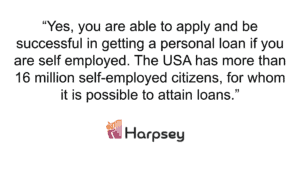Yes, you are able to apply and be successful in getting a loan if you are self employed. The USA has more than 16 million self-employed citizens, for whom it is possible to attain loans. However, it can be a little more complicated, and sometimes more difficult, than if you were getting a loan with a W2 job (a job that is on payroll).
Self-employed people are seen as not having the most stable of incomes, even if they have been at their professions for many years, so lenders tend to approach with caution. Your chance of approval is greatly improved if you have been self-employed for more than 6 months. If you have been self-employed for a long period of time, then you are more likely to gain the trust of a lender.
This guide will help you understand how to get a loan if you are self-employed, and how to maximize your chance of approval.
Why Is It Harder to Get a Loan If I Am Self-Employed?
It is harder to get a loan if you are self-employed for several reasons. The key reason being that lenders will be more cautious about giving a self-employed individual a loan. This is because it is less easy to prove income as a self-employed person. You don’t get pay stubs or W-2s from an employer that show that you earn enough income to make monthly payments. Lenders feel that there is therefore less guarantee of income and thus a higher chance that the loan applicant will be unable to pay back the loan.
However, there are ways to increase your chances of being accepted for a payday loan if you are unemployed.
How Can I Get a Loan if I am Self-Employed?
There are several ways to get a loan as a self-employed person. The three primary ways are:
- You are in a stable profession
- You have a good credit score
- You have been self-employed for a long time
Stable Profession
There are many good professions which would fall under the self-employed category. If you work in one of these, your chances of being accepted for a loan are very strong. These can include such professions as:
- Electrician
- Plumber
- Dentist
- Builder
- Private contractor
Furthermore, if you own a reputable company and can provide strong financial records with good and regular revenue, being self-employed may not be an issue at all.
Good Credit Score
Without a decent credit score (most lenders look for the 600-700 mark to qualify for a loan), it can be difficult to get a loan. And if you are self-employed, it can be even harder. Therefore, it is important to check your credit score before applying for a loan in order to avoid disappointment. This can be done for free through your bank.
When checking your credit score, it is important to ensure that it is error-free. This is because if there are mistakes that worsen your score, you will have less chance of successfully applying for a loan.
Checking your credit score in advance will give you peace of mind before you apply for a personal loan. It may also give you time to improve your score before you even apply.
Self-Employed for a Long Time.
The longer that you have been self-employed, the better chance you have of being accepted for a payday loan- especially if you can provide proof of a stable income.
If you state in your loan application that you have only been self-employed for a short-period of time, payday loan lenders may see this occupation status as a result of being laid off, or fired, from a previous occupation.
What Information Do I Need to Provide to Secure a Self-Employed Loan?
You will need to provide a lot more information in your loan application than if you were an individual working in a W2 job. Personal loans for self-employed people often require more paperwork in order to prove regular and sufficient income. Therefore it is a good idea to have the necessary paperwork ready before you apply for the loan, so that the application process is as smooth as possible. While each lender has their own requirements regarding the documents necessary for application, you may be asked to produce the following:
- Tax Statements (transcripts, returns, schedules)
- Profit and loss statements (from your company)
- Bank Statements
- 1099s
Most lenders will want to see at least two years worth of income documents when you make your application. This is because they want to see a pattern of consistent income. The longer you’ve been self-employed, and therefore the longer you can show that you have been earning a consistent income, the better the chances you have of qualifying for a payday loan. Before lenders set a credit limit, they will want to be confident that you are able to repay the loan.
How Do I Repay My Payday Loan as a Self-Employed Person?
If you are successful in your loan application, you should begin to think about how you will repay your payday loan, in order to avoid any unwanted debt.
Typically, you will be given up to a month to repay the money that you borrowed plus interest. The most common way to repay a payday loan is through your bank debit card. When you obtain the loan, you agree to allow the lender to take money from your bank account.
A good idea is to pay back your loan through autopay. If you do this, you will never have to worry about late fees or paying loan payments on time.


